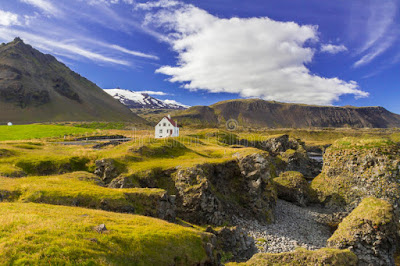Dear Haijin, visitors and travelers,
Today we arrive at Iceland on our quest around the world for folkmusic. The music of Iceland can be traced back to the 14th century. The "oldest" known folkmusic of Iceland is the so called Rimur. What is Rimur? Let me tell you a little about it.
Rímur is a type of epic vocal poem, with fixed diatonic melodies. Rímur melodies (rímnalög, kvæðalög, stemmur) are often standard, and found throughout the country. These epic poems are written in a narrative style, using elements of Icelandic literature and folklore. The performers were lauded for their ability to tell a story in verses. A rímur verse is made up of trochaic lines which use literary techniques such as rhyme and alliteration. There are between two and four lines with a pattern of syllabic stress and alliteration. Music author Hreinn Steingrímsson describes rímur this way:
[...] "The four-line metres are a combination of two couplets with four stressed syllables in the first line of each, and two such syllables (first and third, second and third, or third and fourth) alliterate with the first stressed syllable of the second line."[...]
The earliest known text of a rímur dates to the 14th century; for the subsequent six hundred years, the rímur texts were the most prolifically produced form of Icelandic literature. Rímur melodies date back to publications by folklorist Ólafur Davíðsson and were then collected in the first Icelandic folk music collection, Íslenzk þjóðlög, by Bjarni Þorsteinsson.
Rímur, specially the short four-line metres form "ferskeytla", is still very popular today in Iceland in most social groups. It is common to put together a ríma (setja saman stöku) about current events usually in the form of a joke or ridicule. These short rhymes tend to proliferate via email. It is also common during parties that a guest may say a ríma that he has learned or composed as a form of a joke, often an insult. Skill at composing rímur is often an admired skill.
A common game is to tell the first part ("fyrri partur", the first two lines) of a ríma, and for others to complete the third and fourth lines (to "botna"), each in their own way. The one whose "botn" is the cleverest wins. This game can become a serious competition (known as "kveðast á") when two or more who are particularly skilled at composing rímur come together. It is an informal rule that if one is ridiculed or even insulted with a ríma he must answer back in kind; any other form of answer is invalid.
 |
| Icelandic landscape |
The above explanation of the game with rima sounds great and in a way looks similar with Tan Renga or Renga. Two nice Japanese poetry forms created by two (or more) haiku poets.
I hoped to find an example of this rami, but I didn't succeed. Therefore I love to share a nice Icelandic poem by Jonas Hallgrimmson:
Serene and warm, now southern winds come streaming
to waken all the billows on the ocean,
who crowd toward Iceland with an urgent motion —
isle of my birth! where sand and surf are gleaming.
Oh waves and winds! embrace with bold caresses
the bluffs of home with all their seabirds calling!
Lovingly, waves, salute the boats out trawling!
Lightly, oh winds, kiss glowing cheeks and tresses!
Herald of spring! oh faithful thrush, who flies
fathomless heaven to reach our valleys, bearing
cargoes of song to sing the hills above:
there, if you meet an angel with bright eyes
under the neat, red-tasseled cap she's wearing,
greet her devoutly! That's the girl I love.
© Jonas Hallgrimmson
What a wonderful poem this is, but not really my "cup of tea". I am not a big fan of creating this kind of poetry, but I love reading poetry in all its wonderful ways.
seabirds cry without tears
waves caressing the shore
a warm embrace
waves caressing the shore
a warm embrace
© Chèvrefeuille (experimental)
What a wonderful music ... really amazing and I hope you liked it too. I hope this music will inspire you.
This episode is NOW OPEN for your submissions and will remain open until August 27th at noon (CEST). I will try to publish our next episode later on.

No comments:
Post a Comment